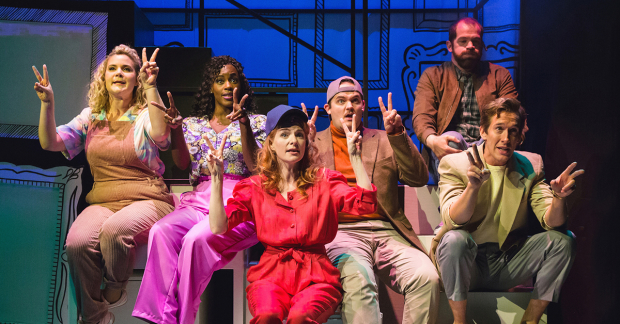Review: Falsettos (The Other Palace)
William Finn and James Lapine’s musical has its UK premiere

© The Standout Company
The word "extraordinary" gets used so often when discussing art, it's almost surprising to encounter a work that thoroughly deserves the description. Such is the case with William Finn and James Lapine's Falsettos, receiving its London bow 27 years after the Broadway premiere. It was worth the wait. Especially for a production as good as this one, staged with an intelligence and theatrical flair that should catapult director-choreographer Tara Overfield-Wilkinson into the tiny band of British creatives that manage both skills seamlessly. Here's a show that makes your heart soar before breaking it.
Falsettos melds together a pair of modern-ish Manhattan chamber operas about a young Jewish family in crisis. The first act, set in 1979 and originally entitled March Of The Falsettos, premiered in 1981 and was seen briefly in the West End in the late 1980s. It explores what happens when patriarch Marvin leaves wife Trina and pre-teen son Jason for a male friend. The second part, Falsettoland, written several years later, features the same characters two years on as the spectre of AIDS first looms over the New York gay community. It's sobering to consider that Finn would have been unlikely to predict the grief ahead for this "tight-knit family" when he finished writing the first part of their story.
The score is a beauty, taking in everything from lyrical arias to flashy showbiz numbers, laced with jagged, fiendishly complex stretches of recitative. It's clever, tumultuous but accessible, often gorgeously melodic. At times, particularly during the frenetic first half, it feels as though Finn is channelling the hyper-caffeinated NYC setting through staccato rhythms and sassy, heartfelt tongue-twister lyrics. In the musical theatre canon, only Sondheim's Company, which Falsettos sometimes resembles, captures the essence of that great city as effectively. The slightly abstract storytelling won't be to everyone's taste, but working with it reaps considerable rewards.
The depth of characterisation is another remarkable aspect of this sophisticated concoction: these are flawed, relatable, funny people. The piece still feels astonishingly fresh in its representation of non-clichéd gay characters and its insistence that family happiness and homosexuality are not mutually exclusive. This may feel like old news now but in the late '80s/early '90s it was revelatory.
Anybody who still clings to the hackneyed belief that you don't get real acting in musicals needs to be frog-marched to this production. Every member of Overfield-Wilkinson's sublime cast finds a specificity and emotional authenticity in these characters and their complex relationships that verges on breathtaking. They also exhilaratingly negotiate the demands of the epically demanding score, while executing the transition from naturalistic movement to flashy choreography, which can sometimes jar in small scale musicals but never does here.
In less skilled hands, Marvin could merely seem a self-obsessed man-child; while Daniel Boys' terrific performance doesn't shy away from presenting that aspect of him, he finds an unsettling inner turmoil and achieves a heartbreaking vulnerability by the show's tearstained conclusion. Oliver Savile invests his lover Whizzer with charm, charisma and a fascinating aloofness.
Laura Pitt-Pulford is flat-out stunning as abandoned Trina, desperately juggling jealousy, fury, the upcoming Bar Mitzvah of her precious but precocious son, a collapsing sense of self-worth and an increasing attraction to the family psychiatrist (Joel Montague, delightful). She stops the show with her manic Vaudevillian number "I'm Breaking Down" where Trina hilariously does just that. As "the lesbians from next door", a doctor and caterer who befriend Marvin, Gemma Knight-Jones and Natasha J Barnes side-step cliché and present a pair of feisty, sexy, kind women that would improve your life just by being in it.
A team of boys alternate in the role of chess-playing, super-smart Jason and one hopes they are all as wonderful as Albert Atack on press night, who comes dangerously close to stealing the show from his adult colleagues. He's incredibly cute, but not excessively so, and impressively charts the child's emotional response to family tragedy.
P J McEvoy's witty set design marries a chessboard motif with a succession of family portraits, alongside nods, via projection, to the pop art of Keith Haring whose iconography was synonymous with the early days of the AIDS crisis. Michael Starobin's original orchestrations remain gorgeous.
This is a musical treat for grown-ups. Emotionally rich, theatrically satisfying and altogether, yes, extraordinary.



















